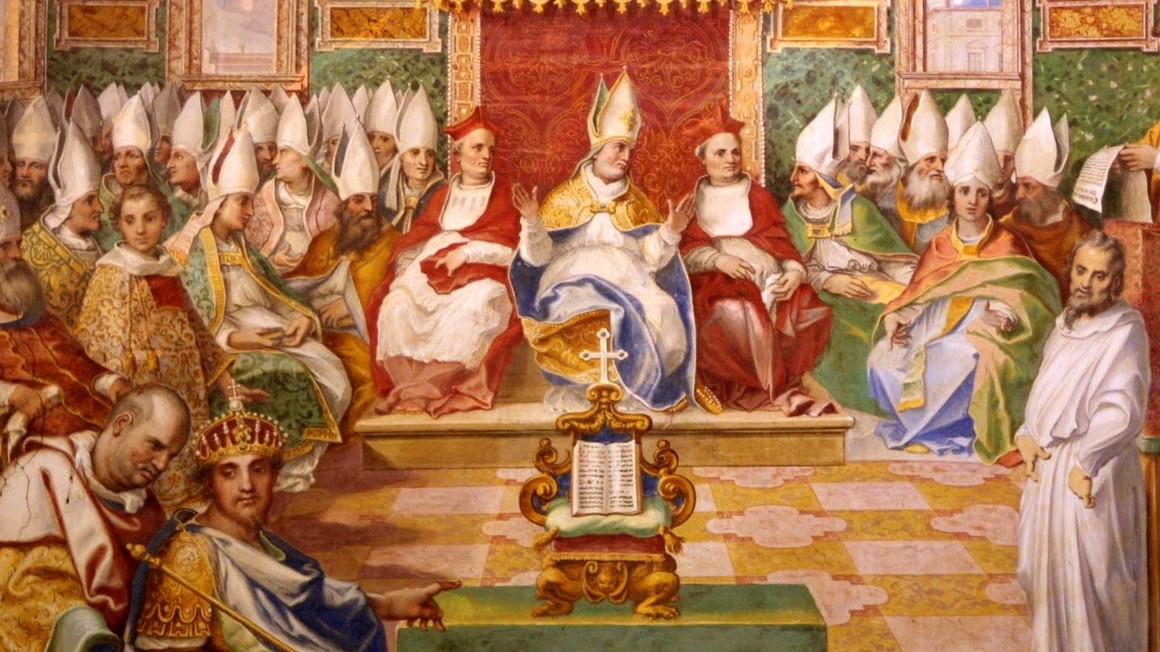

Deacon-structing: What is a Synod and why do we have them?
Deacon Pedro
Monday, October 4, 2021

Detail of a fresco in the Sistine Chapel which depicts the Council of Nicaea (Source: Wikimedia Commons)
You may have heard that the next Synod of Bishops is on the topic of synodality. This synodal process begins in October 2021 and concludes in October 2023. You will hear lots more about this synod over the next two years.
Some of you may be wondering what a synod is and what synodality means. To begin unpacking that, I want to go right back to our Scriptures.
The Church has been having “councils” or meetings to figure things out since the time of the Apostles. The first church council was the meeting that Paul had with Peter, James, and the Apostles to deal with the issue of circumcision for Gentile converts. That was the Council of Jerusalem, and it happened around 48 AD (see Acts 15).
Since then, every time the Church encountered an issue that required clarification, a council was held.
We’ve all heard of Church councils. The most well-known are Nicaea, Constantinople, Ephesus, Chalcedon, Lateran IV, Trent, and Vatican II. These were all called in order to respond to a crisis, heresy, or question, and as a result, doctrine was defined.
For example, the First Council of Nicaea in AD 325 gave us the Nicaean Creed. It also:
 Every week, Deacon Pedro takes a particular topic apart, not so much to explore or explain the subject to its fullness, but rather to provide insights that will deepen our understanding of the subject. And don’t worry, at the end of the day he always puts the pieces back together. There are no limits to deaconstructing: Write to him and ask any questions about the faith or Church teaching: [email protected]
Every week, Deacon Pedro takes a particular topic apart, not so much to explore or explain the subject to its fullness, but rather to provide insights that will deepen our understanding of the subject. And don’t worry, at the end of the day he always puts the pieces back together. There are no limits to deaconstructing: Write to him and ask any questions about the faith or Church teaching: [email protected]
-
- defined the divine nature of God the Son and his relationship to God the Father;
- defined the universal observance of the date of Easter, and
- promulgated early canon law.
-
- 2001 "The Bishop: Servant of the Gospel of JESUS CHRIST for the hope of the world"
- 2005 "The Eucharist: Source and Summit of the Life and Mission of the Church"
- 2008 "The Word of God in the Life and Mission of the Church"
- 2012 "New Evangelisation for the Transmission of the Christian Faith"
- 2018 “Young People, the Faith and Vocational Discernment”
“To conclude the Synod means to return to our true 'journeying together' in bringing to every part of the world, to every diocese, to every community and every situation, the light of the Gospel, the embrace of the Church and the support of God’s mercy!”Ultimately that is what we do as Church: We meet people where they are in every place and in every situation. We walk with them, we listen to them, and then we try to do our best to bring to them the truth and the light of the Gospel, the good news! And then we continue to walk with them, through their joys and struggles, through their hopes and fears: We share with them Jesus himself, and then we let Jesus do the rest! And so, a synod on synodality is really a synod about what it means to be Church.
 Every week, Deacon Pedro takes a particular topic apart, not so much to explore or explain the subject to its fullness, but rather to provide insights that will deepen our understanding of the subject. And don’t worry, at the end of the day he always puts the pieces back together. There are no limits to deaconstructing: Write to him and ask any questions about the faith or Church teaching: [email protected]
Every week, Deacon Pedro takes a particular topic apart, not so much to explore or explain the subject to its fullness, but rather to provide insights that will deepen our understanding of the subject. And don’t worry, at the end of the day he always puts the pieces back together. There are no limits to deaconstructing: Write to him and ask any questions about the faith or Church teaching: [email protected]Related Articles:
<<













